Jeremy Yang
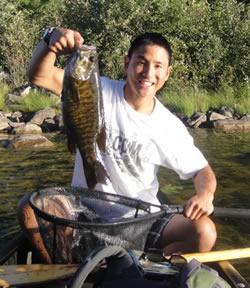
Throughout several past summers, a "NO SWIMMING" sign has been posted nearby Thunder Bay's Boulevard Lake due to the high levels of E. coli in its waters. As the presence of E. coli is popularly associated with that of fecal contamination, it is widely assumed that the lake's bacteria originated from a sewage leak or other source of fecal matter.
Environmental engineering student Jeremy Yang believes this may not be the case.
He and his supervisor suspect that the bacteria could very well come from a natural source and they are currently in the process of tracking it down. This requires a great deal of fieldwork in order to effectively monitor the E. coli and trace its origins through DNA fingerprinting.
This project, and his program as a whole, has enabled Yang to combine two fields of interest into one graduate experience. While Yang completed his undergrad in biology, he was enticed by the practical focus of engineering.
"Engineering is more applied; instead of only studying microscopic details, we can really see what's happening, the bigger picture... it applies the theories that biology derives."
He's enjoyed the program's multidisciplinary learning opportunities and balances the demanding curriculum with his favorite active pastimes. He is a competitive member of the Thunder Bay Judo Club and enjoys soccer, basketball, and fishing.
His fieldwork also offers a reprieve from the lab as Yang has a great love for the outdoors, developed early on from a childhood spent "playing in the woods". He also enjoys working with his supervisor, whom he describes as being very supportive, encouraging, and generous -- on particularly long days in the field, he will even treat Yang to lunch.
In his future, through higher studies or a job in the field, Yang desires to continue to apply his knowledge and skillset towards the welfare of the environment, which he finds to be a most fulfilling cause.
"Hopefully, through my research, I can help in some way."
Pam Tallon

For Pam Tallon, every second counts.
Already holding an MSc in microbiology, she is currently employed as the Research Lab Coordinator at NOSM (Northern Ontario School of Medicine) where her long list of responsibilities includes administration, protocol and policy development, equipment or technical assistance, and facilitating various lines of medical research.
On top of this, she runs the administration, finance and sales for a web and graphic design firm, continues to write blog articles for the Financial Post, and serves as the union steward for OPSEU Local 677.
Yet despite this already jam-packed schedule, Tallon is currently in the process of earning her MBA. At Lakehead, she's able to pursue this education part-time after standard office hours and incorporate graduate studies into her fast-paced lifestyle without relying on distance or computer-based classes.
As a part-time student, she especially appreciates the small class sizes, which have allowed her to readily interact with her peers and professors during her limited time at school - a definite advantage when it comes to group work and projects. She adds that the size of the university enables it to be flexible in the face of change. "Lakehead can adjust their curriculum to meet the demands of the changing business environment much more quickly than a large, entrenched business school."
As well, Tallon has enjoys the opportunities in Thunder Bay, especially the relaxed 'speed of life'. "Even with the busy schedule of an MBA, you have plenty of time and ability to go out, explore, enjoy nature, and socialize, often all in the same day"
Tallon hopes that her MBA will build upon her experience and education and that her current employers will benefit from her enhanced skill set. She explains that the degree may also serve as a 'hedge bet' if the economy turns sour and research funding is cut. "This education will allow me the ability to more easily adapt and realign into a new career or even pursue entrepreneurial avenues... I'm quite a fan of self-sufficiency."
Holly Morgan

English student Holly Morgan is delving into the mysteries of South Asian fiction and doing so quite successfully. Her current project is exploring how queer female sexualities are "constructed as impossible" in several of the region's diasporic novels and films.
Morgan's main objective is to look at how authors depict the process of acculturation in relation to sexuality. "Women are often the ones who maintain familial traditions," she explains. "I wanted to look at the way that queer female sexuality was constructed in relation to the expectations placed on female characters in South Asian fiction."
Morgan is proud to report that her project received SSHRC funding and went on to receive prizes and praise at the South Asian Literary Association (SALA) conference in Seattle. She reflects that she was pleasantly surprised by how supportive and welcoming everyone was: "This external validation made me feel like I had something to offer outside of the University as well as within."
Morgan has also been most pleased with her department and program overall. While her MA continued to nourish her love for literature and learning after she completed her undergrad, it also offered her the delicious satisfaction of "making connections between texts or events that no one appears to have made." She adds that she's been well-employed, both as a graduate assistant and as a research assistant, and that her department provides a truly supportive environment within which professors not only know students by name but by research interests as well.
As a testament to how invigorated and inspired she's been by her studies, Morgan already has another project in mind, again with regards to South Asian fiction. This time, she hopes to look at how transnational adoption is constructed and how identities are formed and performed in adoptive families of mixed cultural backgrounds.
Mi Li
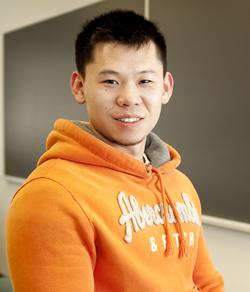
Economics student Mi Li likes a subject with substance. A graduate student in economics, he's able to apply his passion for mathematics and statistics to tackle real-world problems.
"I don't like dealing strictly with numbers - there's no meat there. With economics, you're applying this knowledge to serve a purpose - you have substance, you have meat."
And this "meaty discipline" can be applied through a flurry of fields. Li emphasizes the value of economics in biology, physics, and psychology, to name a few. As an example, he describes how a knowledge of statistics and growth patterns was recently used to accelerate the evolution of DNA and see what a cell would look like in 200 million years.
He himself would eventually like to apply his talents in health care and explains that at a time when the field is being bombarded with financial questions, particularly with regards to the supports needed for the aging population, the health industry is in dire need of economists.
Another area of interest which he's currently pursuing is the enabling of data to speak for itself. Li explains how companies are currently able to manipulate data with ease to serve their own interests and essentially lie to customers. Using a set of techniques called co-integrated variables, Li aspires to eventually develop a model which would enable data to be controlled, thereby generating pure and unbiased information to consumers.
In addition to these research interests, Li passionately keeps up-to-date with the latest news in his field and enjoys discussing current economic affairs with his professors. He says that these conversations on issues of interest like Canada's financial crisis and the national tax system are not only frequent but insightful and stimulating.
"These are issues you often can't solely learn about from a textbook, especially if they're very recent. Our supervisors dedicate a lot of time not only to support us in our studies but also to explore current events around the world."
Dr. Nicholina Youroukos
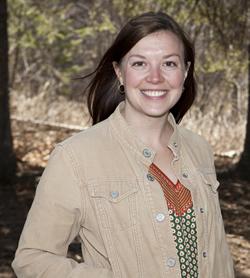
Why should students come to Lakehead for studies in recreation and tourism?
"Why wouldn't they?" is Nicholina Youroukos' immediate response. Having completed her undergrad in outdoor recreation studies and now pursuing an MES in nature-based recreation and tourism, Youroukos affirms that the opportunities for the field in Thunder Bay are truly limitless: "I really feel that Thunder Bay is the recreation capital of Canada."
This is largely why she returned to further her studies in the field. Between her bachelors and masters, Youroukos went on to pursue public relations and landed a marketing job at an art school in Banff. She was prompted to return to Lakehead for the opportunity to combine her passions for tourism and business into one very worthwhile project: assessing tourism's potential to revitalize the North Shore.
Youroukos explains that several communities in the region were hit hard by a decline in primary industries. Approaching a number of business owners who ran everything from motels to campgrounds to retail stores, she wanted to find out how they felt about tourism and how they could orient their businesses to attract tourists to the area. Through her project, Youroukos hopes to both attract new businesses and empower owners already active in the region. "My goal is to have more people discover the unique beauty here and attract people from all over Canada and the world."
Youroukos has travelled all the way down to Chile to present her research and will soon be presenting at a rural policy conference in Ottawa. While these external opportunities are valuable, Youroukos explains that there's more than plenty in Thunder Bay to keep her busy and having a blast. She exclaims her incredulity at the fact that a wealth of outdoor sports and activities is "right at your back door", all of which are extremely affordable. "The quality of outdoor recreation activities I can do here is even better than what I could do in the Rockies, we have world class sea kayaking and ice climbing, to name a few; when wanting to take a break from my thesis, there's a world class cross country ski trail just down the road. This region has so much potential... it's all about attracting the people who can appreciate that."
Jessica McAnulty
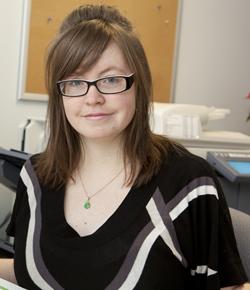
Given social worker student Jessica McAnulty's research interests, coming to Lakehead just made sense.
Having been surrounded by older adults while growing up, McAnulty developed a passion for gerontology from an early age. Lakehead offered a master's with a specialization in the subject as well as a number of impressive research opportunities under well-established professionals in the field.
As her supervisor had a SSHRC grant in one of her key areas of interest, palliative care in long-term care facilities, McAnulty was invited to come on as a Graduate Student Trainee. This meant that she received a scholarship to work on her program, was invited to participate and present at team meetings, and attended several conferences to relay the accomplishments of the national project. She was also provided with a laptop to assist with data collection, data analysis, and knowledge translation. "During this traineeship, I was accepted within a group of national and international researchers as more than 'a student' and was treated like I was a part of the team."
McAnulty was also able to assume a placement at the Centre for Education and Research on Aging & Health (CERAH) on the Age Friendly Thunder Bay Committee. Here, she worked with a number of different community organizations who aspired to have Thunder Bay recognized by the World Health Organization (WHO). This placement offered McAnulty the chance to gain considerable experience in community development, during which she even made a deputation to City Council.
While these opportunities provided McNaulty with a chance to put the topics and concepts she learned in class into practice, they also served to broaden her horizons, enrich her education, and significantly add to her thesis on palliative care programs in long-term care homes.
"I believe that I had many research experiences throughout my studies that I would not have had elsewhere."
Andrew Lints
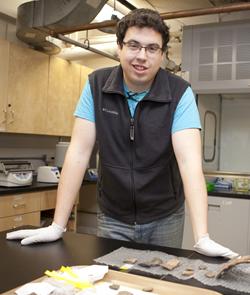
Andrew Lints always wanted to be an archaeologist.
"From a very young age, I had an interest in the past and I think this interest has led me to where I am today."
Which is at Lakehead University using plant microfossils to reconstruct ancient diets. Lints is currently trying to determine whether the Avonlea people on the Northern Plains grew and ate domesticated plants. As the flora consumed by this culture has been largely understudied, Lints hopes these culinary clues will shed some light on the Avonlea's life ways.
Through his program, Lints has had the experience of collecting and analyzing some of the earliest pottery found on the Northern Plains. Traveling to the Royal Saskatchewan Museum, he had the opportunity to examine pottery and stone stools dating up to 1700 and 1950 BP respectively. Lints enjoyed this "going behind the scenes" at the museum and adds that the curators even allowed him to take a peek at the ceramic vessels on display.
Lints' research has already been the focus of considerable attention. Shortly after he defended his thesis, his supervisor was contacted by several prominent archaeologists who believed it to be one of the best they had read "with significant implications for the archaeology of the region". Lints was funded to present this research at national archeological conferences in Calgary and Halifax, through which he also received some valuable feedback.
Lints has enjoyed his graduate experience and expresses his contentment with Lakehead's professors, whom are on the leading edge of current and innovative research. He adds that the professors and technicians collectively go the extra mile, not only by helping students to attain their research goals but also by preparing them for the future in terms of publications and employment-support which largely influenced Lints' decision to take his research to the doctorate level.
"The opportunity to carry out exciting research that provides considerable insight into past life ways on the Northern Plains sparked an interest in me to continue along this vein of study."
Doug MaNearney
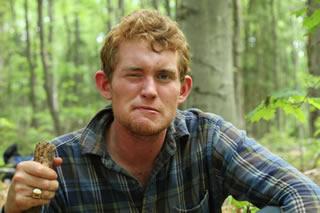
Doug MacNearney leads a double life. An accomplished musician and researcher, the PEI-born forestry student is currently balancing a passion for performing with a call for the wild.
Keen on caribou studies, he's researching how snow accumulation and lichen abundance can influence the animal's habitat selection and use. The population he's studying resides in Newfoundland and is one of Canada's last strong caribou communities. "I'm basically looking at how caribou meet their needs in both habitats and trying to get some insight on how caribou think," explains MacNearney.
To carry out his fieldwork, he spends his summers in Gros Morne National Park, where he's able to carefully monitor his caribou of interest. He returns to Thunder Bay for the school year, during which he analyzes his results, writes his thesis, and entertains the community with a string of shows.
His CBC Music biography describes him as a "child of the 1800s stuck in the future." With the aid of his trusty banjo, the musician fondly reminisces of his childhood in the East, singing about swimming holes and blueberry pie. He has published many demos and is currently finishing a full-length release.
MacNearney also attributes his childhood as the primary motivator for his academic interests. Having frequented Newfoundland while growing up, he became fascinated with the local caribou and concerned for their welfare as the numbers began to dwindle.
"The project really called to me," explains MacNearney. After deciding he wanted to research caribou survival, he found a willing supervisor at Lakehead who promptly obtained funding and set up the project.
To students thinking about graduate studies in general, MacNearney has some advice: "I think a lot of people pursue grad work because it's the next step. It's important to find something you're genuinely interested in - which is easy in our faculty as we have people researching just about everything."
Dr. Chris Southcott
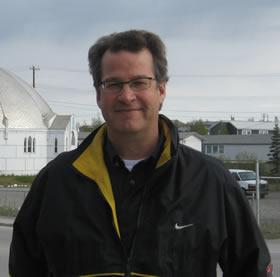
Dr. Chris Southcott has certainly made his mark in Arctic science.
A professor in Lakehead's Department of Sociology, he is also highly involved in the University of the Arctic, an international initiative which seeks to foster a well-rounded understanding of Arctic science and issues within post-secondary institutions. Dr. Southcott led a team of international social scientists to supplement its circumpolar curriculum and served as the University's Research Outreach Chair and director of the Language and Dialogue program.
Dr. Southcott is also Chair of the Social Economy Research Network for Northern Canada, council member of the International Arctic Social Sciences Association, a Senior Research Fellow at the Advanced Institute for Globalization and Culture, and Chair of the Canadian Consortium on Circumpolar Mobility.
His commitment to the field doesn't end here.
Dr. Southcott has also led Canadian researchers in the European Science Foundation's Boreas project, been selected to represent Canada in UNESCO's International Experts on Sustainable Development and Climate Change in the Arctic project, and served as a guest professor for Shotoku Gakuen University in Japan. Not to mention, he's written over 80 reports, books, chapters, and articles on Arctic social and economic change and recently co-edited the first written work to examine the impacts of globalization on Arctic communities.
Despite being an international leader in his field, Dr. Southcott is also a dedicated graduate supervisor whose students benefit considerably from his extensive experience and leadership. As well, many often have an opportunity to embark on their own adventures during their studies - one of his students is excitedly looking forward to an upcoming trip to Iqualuit.
Dr. Southcott recently made headlines at Lakehead for yet another achievement. As project director for ReSDA (Resources and Sustainable Development in the Arctic), he received $2.5 million from SSHRC towards the program. He explains that the aim of ReSDA is to assist the development of more sustainable strategies in the Arctic using a multi-disciplinary approach.
"This network will conduct and mobilize research aimed at the sustainable development of natural resources in a manner that will improve the health and well-being of northern communities, while preserving the region's unique environment."
Dr. Paul Berger
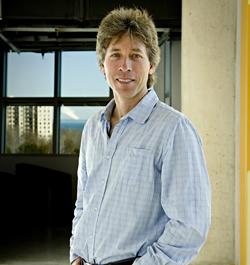
Dr. Paul Berger's dedication to his research has brought him all the way up to Nunavut - where he's seeking solutions to core problems in education.
The Lakehead education professor explains how while the territory is facing a severe teacher shortage, Inuit comprise 85% of Nunavut's population, yet make up less than 30% of the teaching force.
While this differential contributes to the shortage, Dr. Berger also believes that the high number of Quallunaat, or non-Inuit teachers, leads to continuing colonialism in the classroom.
"I contend that Nunavut needs Inuit teachers to decolonize schooling and help make Nunavut schools into Inuit schools."
As well as emphasizing an extreme need for non-Inuit teachers to demonstrate a respect for Inuit culture and act as role models, Dr. Berger is currently exploring what high school students think about a career in teaching and what may deter them from considering this option. Collaborating with 6 teacher education students in Nunavut, his team has interviewed 140 youth in 11 communities.
Prior to this initiative, Dr. Berger pursued a project called 'Finding Inuit Math', which endeavoured to challenge the outrageous stereotype that Inuit people are not good at doing mathematics.
Dr. Berger has found his experience of working with Inuit teacher education students to be very rewarding. Three of his student researchers even joined him in Akueyri, Iceland to present their findings at the 7th International Congress on Arctic Social Sciences. "That was a great experience in a country filled with waterfalls and hot springs."
Also a professor of critical pedagogy, Dr. Berger pushes his students to challenge existing problems in education and seek solutions. One of his students is examining the importance of land in the learning and health of Anishinaabe youth, and another is seeking how to help teachers learn to teach in culturally responsive ways within First Nations communities.
Dr. Berger is also highly encouraging of curiousity, and believes that those who ask many questions often thrive in graduate studies. "It is a privilege being part of a student's curiosity, and I remember my own master's thesis as the most rewarding school work I ever did."

